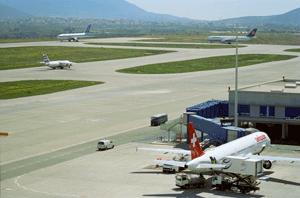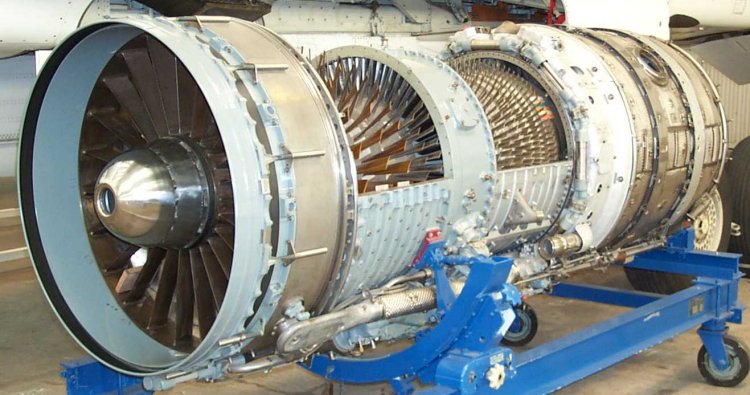 |
|
|
Greece Leads in Sound Suppression for Next Generation Aircraft:
|
|
|
In the midst of all the flak Greeks are now receiving in the fields of economics, politics and fiscal integrity, where they seem to be considered the 21st century’s updated and indebted Mr. Micawbers (“spend less than you earn, result happiness; spend more, result misery!” as Charles Dickens tells us), it is nice to see one area in which Hellas is actually excelling: and that is in the research and design of Sound Suppressors for the world’s next generation of wide-bodied jets, due to enter service from 2013. |
|
| He was personally recommended by Boeing’s Mary Armstrong (Vice President of Environment, Health and Safety Engineering, Operations & Technology) after she saw details of his research. “Yorgas had managed to take an extremely complex issue and reduce it to pure simplicity,” she said. “He merely concentrated on the free flow air patterns, generated by the jetstream and worked on reducing the acoustic impact of the super-heated air on its surrounding environment. These results are now being incorporated into an algorithmic based programme that projects the necessary level of suppression needed during take-off and landing when the planes are in close proximity to passengers, airport staff and local residents. The programme is then used by the engine manufacturer to design the hardware.” |
 |
In his ‘first ever interview’, as he himself put it, the rather shy and retiring Yorgas Pinakidas – son of a Cretan hotelier and an African mother - gave us further details about his work. “You see the main problem is the extremely high pitched jet-scream you get with these engines on take-off, when full power is needed, and on landing when the jets are reversed and used as a braking force. The sound levels generated can very easily permanently deafen anyone exposed to it for more than 5 minutes in any 24 hour time cycle, and whereas engineers and service personnel are required to wear sophisticated ear protectors, this requirement cannot be extended to all passengers and airport personnel within 500m of the aircraft. It is just not feasible” As is, unfortunately, usual among Greeks working abroad, they are far better known in those countries than in Greece itself; and Yorgas is no exception. In the UK, a couple of years ago, he was chosen to conduct Prince Philip (the Duke of Edinburgh) around the state-of-the-art acoustic laboratories at Manchester University and then spent a pleasant hour, over tea, answering questions from the erudite Prince as to how the famed acoustics of Epidaurus Amphitheatre were achieved 2500 years ago. As he warmed to his subject, Mr Pinakidas explained that unless they found a way of quieting the triple X Inline, the engine would never be allowed at major airports; being classed as a major health hazard by health and safety regulations; a situation that would totally negate the value of the hundreds of millions of dollars that have been spent on developing both it and the new generation of super-jets. “What I did was to look at the problem from a different viewpoint. In the past it had always been considered impractical to fit any type of silencer onto these engines as it significantly reduced power at a time when maximum thrust was imperative. Without this thrust the plane just can’t take off. But no-one had ever experimented with multiple exhaust openings for each engine, where the design of each expansion chamber allowed the escaping gases to slow down in speed, but not in power. This conversion from a high velocity exit that causes unbearable jet noise, to a slower, quieter one giving increased power - but at lower decibel levels - still allows the engine to function at high thrust, but is no longer a health hazard.” |
|
“The multi-exhaust openings that I have proposed, slowly increase in physical size, rather like long trumpets; and there are currently 20 exits for each engine in the experimental prototype, as opposed to a single one in a conventional jet engine. These allow the gases to expand and, thus, slow down. However, by increasing the area of contact with the surrounding environment, the slower moving gases do not significantly decrease the power ratio. In effect it is rather like the silencer on a car or a gun, but in actual operation it is better explained as being more similar to volts and amperes in electricity. Whereas 2000 volts at 1 ampere would give a very mild shock, 50 volts at 40 amperes would kill you. Each exhaust opening allows a portion of the gas to escape, but much more quietly.” |
 |
“I suppose you could say that instead of having 4 very large engines for each wide-bodied jet, you have 80 smaller ones that are more environmentally friendly. The push is the same, but the oomph is a lot quieter,” he said, with a laugh. “The same principle could be applied to military aircraft, or even to training aircraft, like Cessnas and Pipers that are often based near large residential areas. Noise pollution could be dramatically reduced.” Over the past decade Greece may have had a series of politicians who have shown rather poor financial sense and planning but, fortunately, this lack of competence does not seem to have affected all fields. Some young Greek researchers, like Yorgas Pinakidas, are still proving, today, that the grasp of science once shown the world by the Ancients is very much alive in the 21st Century, when problems that have baffled giants like Boeing, Airbus and Pratt & Whitney can be solved in novel ways by these innovative and enquiring young people. EN Filing Ref: 01/April/2010 /AFJ, Humour/Corbis Facetus |
|
|
(Posting date 23 May 2010. Previously published in ELT News 1 April 2010.) HCS encourages readers to view other articles and releases in our permanent, extensive archives at the URL http://www.helleniccomserve.com/contents.html, especially those of Mr. Leech (http://www.helleniccomserve.com/archiveleech.html) |
|
|
|
|
2000 © Hellenic Communication Service, L.L.C. All Rights Reserved.
http://www.HellenicComServe.com |
|
